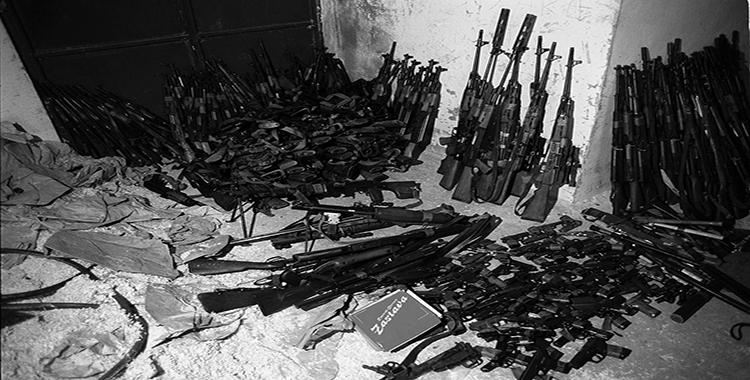Gareth Jones Journal Staff
The United States has long been the chief weapons exporter in the world, with almost no real competition since the fall of the Soviet Union. However, as tensions rise in the Middle East, American weapons dealings appear to have taken on a whole new meaning. A report by the nonpartisan Congressional Research Service published by Congress last month detailed sales figures for 2011, and found that the numbers tripled last year alone. The report cited rising concern over Iranian regional military ambition, and of course the much-discussed nuclear progress Iran has made in recent months.
American allies in the Middle East, namely Israel and Saudi Arabia, but also Kuwait, Iraq, and the U.A.E., have all turned record-breaking amounts of oil money towards militaristic deals with the US, and should the region ever come to war, most likely, it will be M16s doing most of the shooting.
However, what many cite as the most troubling aspect of American weapons dealing abroad is that M16s will be featured prominently on both sides of almost any battle in the Middle East. We sell guns to everyone. And while proponents of our aggressive military sales cite the massive GDP boost and job creation that gun sales bring to a desperately struggling American economy, there are a few questions worth asking.
Firstly, keep in mind that M16s are the tip of the iceberg. The $66.3 billion we did in weapons deals last year is more M16s than every human on Earth could own, so obviously, it goes deeper than that. Jet fighters, rockets, huge missile defense infrastructures and other forms of air transport made up much of that $66.3 Billion. So, supposing Iran attempts to invade Kuwait, it will be F-16s made in Kentucky dropping bombs assembled in Detroit on soldiers wielding M-16s made in Texas.
Opponents of the American military machine argue that we encourage conflict by outfitting everyone with such high-tech stuff, and furthermore have become too dependent on money made from weapons sales, which will peter out as we run out of willing buyers. As a peace-loving hippie, I am inclined to agree, but there are some logistical problems with this argument that cannot be ignored.
Firstly, much of the 30 percent or so of our annual GDP that we spend on the military machine goes straight to the research and development sector. Think Men Who Stare at Goats, or the inevitable scene in every Bond movie where the M.I.T. looking guy hooks up 007 with a watch that doubles as a nuclear submarine or a teapot. Research and development is the American answer to the wavering demand for weapons globally. Essentially, one year we will sell everyone a jet that travels 2000 m.p.h., and then next year we develop a jet that travels 3000 m.p.h., making the jets from last year obsolete. Then, the military-obsessed third world gets in line to buy the new stuff, for fear of being invaded by superior technology, or not looking cool at the Christmas party. Steve Jobs would be so proud.
We develop more cool stuff, the hand-me-downs are distributed further and further down the economic ladder, keeping us at the top. This is consequently why you will stumble across a fleet of discount rate F-16s sitting in warehouses in Zambia, with enough combined fire power to destroy the state of Rhode Island. So, as long as we can keep pumping out the technology, there will be buyers. I mentioned Steve Jobs in jest earlier, but in all seriousness, have a look at Apple stock these days. The system works, and guns will remain one of the most important exports in the American economy for quite a while.
As far as morals are concerned, I like to take a realist approach to the situation. If they were not holding M16s, they would be holding AK47’s, or whatever the Chinese equivalent is. Humanity was at war pretty much the minute we dropped out of the trees, and just because we sell awesome guns does not mean we perpetuate war. If anything, we keep everyone so worried about keeping up with what’s cool, that no one has anytime to actually invade anywhere. By selling guns, maybe we have actually become arbiters of peace? Quite the Catch 22. But then, when military involvement takes place, what isn’t?
_________________________________________________________
David Frederick Journal Staff
Recession and election aside, nothing can stop the arms trade. It is an ugly statistic, which has a body count that is only outnumbered by its spending costs. The times may have changed but the game is still very much the same. This includes supplying an ally (likely one that is at odds with a fellow enemy) with an armory to exterminate their problem. Last year alone, weapons sales tripled to a sky rocketing $66.3 billion, which was by the way of deals to our Persian Gulf allies.
We agreed to sell F-15 fighter jets valued at nearly $30 billion to the Royal Saudi Air Force. “This sale will send a strong message to countries in the region that the United States is committed to stability in the Gulf and the broader Middle East,” said Andrew J. Shapiro, the assistant secretary of state for political-military affairs. “It will enhance Saudi Arabia’s ability to deter and defend against external threats to its sovereignty.”
We cannot forget about the arms deal that the Obama administration was pushing for earlier in the year with Bahrain. A previous arms sale was suspended late last year after fierce opposition from human rights groups and members of Congress. But the White House decided to take advantage of a legal loophole to push forward a separate deal without congressional approval.
The deal was advancing despite Bahraini government crackdown on several US-based NGOs, like the National Democratic Institute and Physicians for Human Rights. Staffers with valid Bahraini visas have been barred from entering the country.
This week, talk of Washington continuing arms sales to Taipei to give Taiwan confidence in negotiations with China is being discussed. There is a correlation between arms sales and improved cross-Taiwan Strait relations, said Randall Schriver, a previous state department official, at an international conference in Taipei analyzing the ongoing power transition in China, furthering assumptions that U.S. arms sales could become an impediment in future Taiwan-China relations. U.S. F-16 sales to Taiwan in 1992 were followed a few months later by the “1992 consensus” and a U.S. $6.4 billion arms package to Taiwan in 2010 was followed a few months after that by the signing of the cross-strait Economic Cooperation Framework Agreement, Schriver said.
It is quite an interesting business, a business that does not have a place in it for morality. I will not get on a soapbox about the philosophy of the goods and evils of being an arms dealer, even with it bringing the promise of a different or exciting life. It must weigh down somewhere in the sub-conscious. Of course I “understand” our duties to other countries and I understand that loyalty does play quite the big issue as well. Our supporting of Saudi Arabia, Bahrain, and Taiwan is also at stake. You come to realize that these arms dealings will continue to go down through history and will go on as along as our international differences need these weapons to solve our discrepancies.
The exuberant amount of money that is carelessly thrown away on turf wars is already at a greater sum of currency then I will ever see in my life. More than you will see and probably more than your kids will see. Do I think this spending should be cut, at a high percentage? Yes, almost more than anything, yes. Chances are tough; it probably won’t change anything and my far left-leaning ideals are just a mere pipe dream. Well, the most that I can hope from anyone is that even if you cannot do something about arms spending, that at least being aware is a good first step into becoming the change.













World War 3 Watch • Nov 29, 2012 at 10:31 pm
International Opinion: U.S. Weapon Sales: A Necessary Evil? #USA #WW3 http://t.co/6amFdhu1
The Suffolk Journal • Nov 29, 2012 at 2:37 pm
[International Opinion] U.S. weapon sales: a necessary evil? http://t.co/xlGLggyY